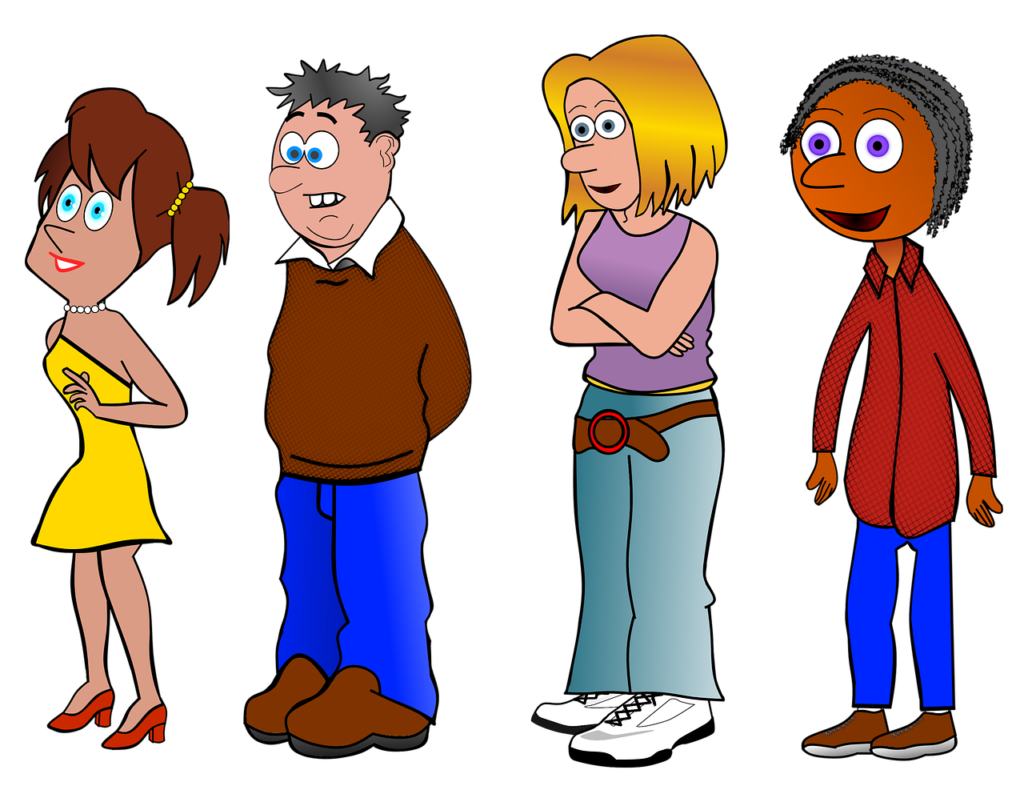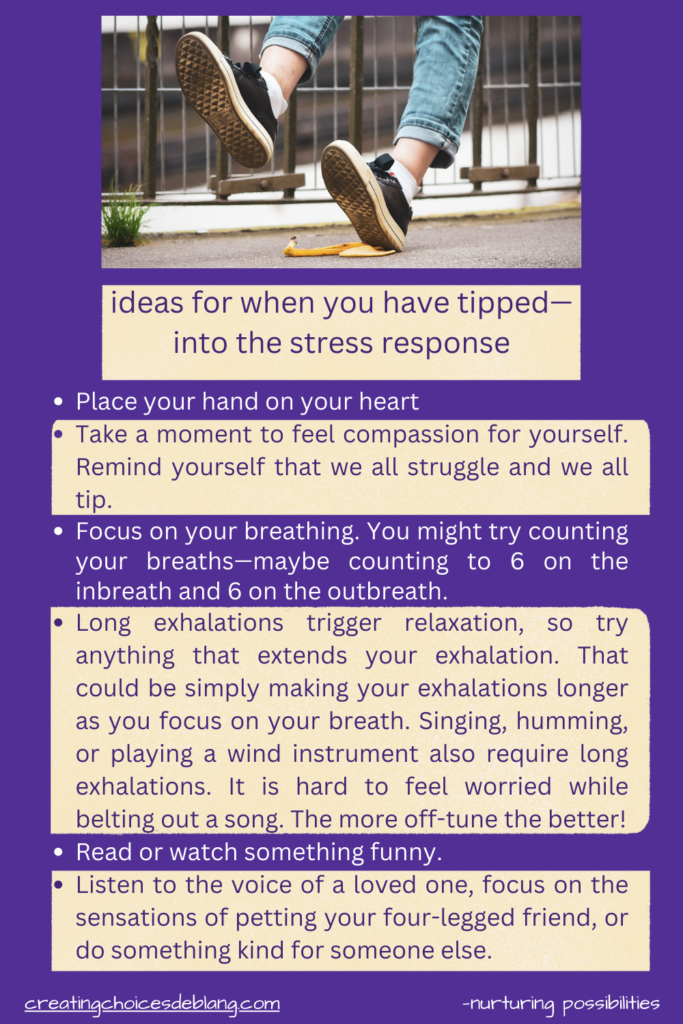Do you struggle with motivation?
Does it seem like a quality that you just don’t have enough of? Or maybe you see a lack of motivation as a personal shortcoming?
It’s certainly true that we all have strengths and weaknesses. And some of us do seem to be blessed with more natural perseverance than others.
And motivation has far more to do with what is going on in our nervous system than our personal characteristics.
What is the nervous system?
The nervous system includes the brain, the spinal cord, and the nerves. It might be considered a command center or system in the body because it controls so many functions.
The nervous system picks up information from inside and around us to determine how the body should respond.
For instance, the nervous system sends signals allowing the body to relax, when it deems that it is safe to do so, and signals the body to mobilize its resources when a challenge or threat is detected. Messages are constantly flowing back and forth between nerves in the body and the brain.

We used to believe that this transmission was primarily from the “top-down” or from the brain to the body. We now know that a greater number of messages move from the body to the brain than the other way around. The vagal nerve plays an important role in this transmission of information.
What the nervous system “decides” determines the body’s state. These decisions determine whether we will be in a growth and restoration state or prepared to fight off an attacker.
So, what does this have to do with motivation?
Our state determines whether motivation is even a possibility
Most of us believe that we are purposely deciding and directing our actions at all times. And that if we wanted to be more motivated, we could. This just isn’t true.
Our state determines whether we can be purposeful and motivated.
The only state in which it is possible to be motivated toward goal-directed behavior is the state I describe as “the middle.” There are many terms used to describe this state of homeostasis in the body.
I like the term “the middle” because it is also a helpful term in describing the process of maintaining relationships while staying connected with our own needs. If you would like to learn more about the middle from this perspective, you can do so in my book Never Enough—Separating Self-Worth from Approval.
What is “the middle” state?
The middle is a state of homeostasis in the body. It is the state where rest, growth, joy, and connection are possible.
An important benefit of being in the middle is that this is the state when the thinking brain is fully functional. This means we can observe ourselves and others, our environment, figure out what we need and make plans for our future behaviors.
Being in the middle also allows us to feel joy, love, and connection with others.
This is the state where self-directed, purposeful behavior is possible.
Many times, what people describe as a lack of motivation, is actually the experience of being tipped.
When we are tipped, it is like being along for the ride
When we have tipped out of the middle, or when the body has mobilized to face a threat, the more primitive parts of the brain are running the show. The thinking brain is disabled by the stress hormones. What this means is that we operate primarily without conscious control.
If you have ever been tipped and did exactly what you said you would never do, you know what I mean. Maybe you said, “I’m not shopping on the internet until I get my credit card balance down.”
And then on that day from, “you know where,” you find yourself shopping away with no memory of your plan to avoid it.
“I want it now!!”
When we are tipped, seeking immediate relief is instinctual—it is a survival response. As a result, we want what we want, right now, with no awareness or concern for the consequences of our actions.
Have you felt that way when you were tipped? Almost driven—like you just had to have those cookies, that candy bar, that glass of wine, or maybe you felt compelled to do something to make sure someone is happy with you?

Early on in our work, clients often describe these behaviors as a lack of self-control or willpower. I encourage them to realize that when we are tipped and the more primitive parts of the brain are running the show, a pull toward reward, escape, or safety is normal and to be expected.
Making decisions in line with our long-term goals is not an option when we are tipped. This is important, so I want to say it again, thinking of our long-term goals is not possible when we are tipped because our thinking brain has been disabled by the stress hormones.
There is an important reason for the disabling of the thinking brain during the response to a threat and that reason is survival.
What use is having eaten a healthy snack if I’m going to be dead?
Stopping to think could put our life in danger when we need to act quickly, and survival is always going to trump focus on long-term goals.
Not following through with goals in a tipped state has nothing to do with motivation or willpower. It is about our body’s instinctual focus on survival.
Lions and long lines
Our body doesn’t differentiate between a predator chasing us and being at the end of our rope from waiting in a long line when we are already late to pick up our kids from school.

Danger is danger to the body and something to be avoided. Whether it is a predator or the danger we feel from being late, the body is going to help us by mobilizing its resources. Or it will demobilize into the freeze response. Either way, the thinking brain will be disabled, allowing us to act instinctively to be safe and get relief.
The problem in a situation like the long line is that none of our instinctual responses work very well. We could get in a fight with the people ahead of us or those in charge. We could run away, or we could freeze.
None of those are very good options for being stuck in a line. And making things worse, if I am tipped as I wait in line, I will have none of the problem-solving abilities of the thinking brain to help me figure out what would be a reasonable choice of action.
Beating up on yourself only furthers your tip
What do you do when you notice that you haven’t been sticking with your plans?
Are you kind to yourself or do you get down on yourself?
How you react is going to determine whether you get yourself upright and back in the middle, or whether you will tip even further.
The further you tip, the less possible it will be to move toward your goals. We cannot grow from a tipped place. Survival and relief are the only priorities and possibilities.
what can you do if you notice you are tipped?
Remember your nervous system is going to be determining which way you go—back up to the middle or further into a tipped state.
So, anything that is going to calm your nervous system will help to get your thinking brain back on board.
Here are some ideas.
- Place your hand on your heart.
- Take a moment to feel compassion for yourself. Remind yourself that we all struggle and we all tip.
- Focus on your breathing. You might try counting your breaths—maybe counting to six on the inbreath and 6 on the outbreath.
- Long exhalations trigger relaxation, so try anything that extends your exhalation. That could be by simply making your exhalations longer as you focus on your breath. Singing, humming and playing a wind instrument also require long exhalations. It is hard to feel worried while belting out a song. The more off-tune the better!
- Read or watch something funny.
- Listen to the voice of a loved one. Focus on the sensations of petting your four-legged friend, or do something kind for someone.

Click here to download.
And doing what you can to keep from tipping in the first place is even better—and easier.
Staying in the middle is much easier than getting yourself back there
This makes intuitive sense, doesn’t it? Isn’t it easier to stay upright than to get yourself back up once you’ve fallen?
There are many reasons that getting yourself back to the middle can be challenging. Here are a couple.
First and most importantly, to right yourself, you have to first notice that you are tipped. This is harder than it sounds.
When tipped, beliefs, reactions and feelings seem like facts. It is very difficult to see it any other way. Remember, the part of the brain that allows us to observe and evaluate has been made less functional by the stress hormones.

When your ability to observe is restricted, it is hard to “see” that you are tipped.
Second, remember there is a pull to action when we are tipped. Interrupting that can be hard.Think about talking yourself out of running from a burning building. It doesn’t matter that the burning building is actually hundreds of little stressors throughout your day!
In the middle, we can be aware of the consequences of our actions. We can remember what it felt like to spend too much money and make the decision not to do that again.
In the moment resolve
It is the moment-by-moment resolve to stay connected with our feelings and needs, both physical and emotional, that gives us the best chance of staying upright.
It may not seem like speaking up when you need to or giving yourself a break when you are tired will make a difference in meeting goals like getting more exercise.
And if you haven’t paid attention to what is happening inside and have let stress mount to the point of tipping, you will no longer be capable of focusing on your long-term goals.
Without awareness of the consequences, why bother?
Without awareness of the benefits of our long-term goals or the negative consequences of our actions, why would we be motivated to change? Isn’t it the awareness that motivates us to do what is necessary?
There is no ability to be aware of the consequences of our actions when we are tipped. That kind of awareness just isn’t possible.
What will you do?
I hope what I have shared will help you ease up on yourself when you notice yourself straying from your goals.
I hope when that happens, you will take a moment to check in with yourself, to feel compassion for right where you are, and to do what you can to get yourself back to the middle.

Doing that will give you a much better chance of reconnecting with your motivation than beating up on yourself ever will!
I would love to hear any reactions or questions you might have. You can share those by leaving a comment below or by emailing me at [email protected]. And if you know of someone who might benefit from this information, please pass it along.
With warmth and kindness,
Deb

If you find it hard to be yourself in the world, need to keep others happy to feel okay about yourself, or get derailed by disapproval, check out my book Never Enough—Separating Self-Worth from Approval
If you enjoyed this article, be sure to signup below so that you will receive notification when articles are published. Want to share your thoughts or have a topic you are interested in learning about, scroll down to leave a comment.

0 Comments